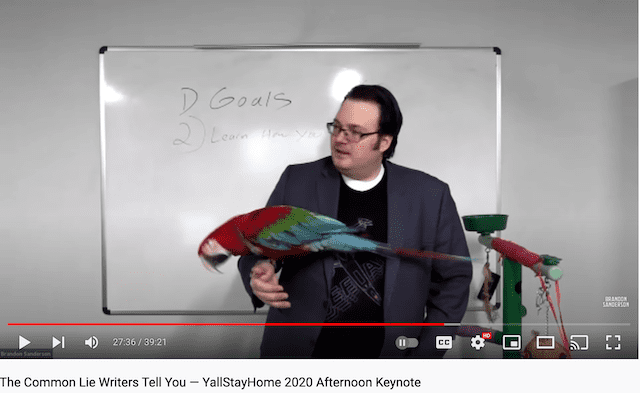Brandon Sanderson’s Advice for Doing Hard Things
February 25th, 2022 · 2 comments
A reader recently sent me a video of a keynote speech, delivered in 2020 by the popular fantasy novelist Brandon Sanderson. The title of the presentation was “The Common Lies Writers Tell You,” but its real message was more general.
Sanderson starts (perhaps channeling a young Cal Newport) by pushing back on our common instinct to tell kids “you can do anything you want to” or “follow your dreams.” He argues that these aphorisms inflict a disservice on impressionable minds as they obfuscate the complexity, and frustration, and nuance involved in actually pursuing remarkable goals.
He retorts that the following claim is much more realistic:
“I can do hard things. Doing hard things has intrinsic value, and they will make me a better person, even if I end up failing.”
Sanderson then proceeds to details three tips, drawn from his experience as a successful novelist, to help structure any attempt to tackle hard things. I found his advice both interesting and refreshingly blunt, so I thought it might be useful to summarize his three tips here, annotated with some of my own thoughts…
Tip #1: Make Better Goals
After winning a story writing contest in high school, Sanderson decided to pursue the goal of becoming a professional novelist. He ended up writing thirteen novels in a row before he sold one. Looking back, he describes this as a bad goal as it was something he could not directly impact through his actions. A better focus would have been on completing a certain number of novels, each one better than the last, regardless of whether or not they sold or made him famous.
“Make goals that you have control over,” he explains.
Readers of Deep Work might recognize a similar theme in my discussion of the 4DX methodology, and its emphasis, in particular, on tracking lead instead of lag indicators. Your goal, for example, shouldn’t be to get your next academic paper accepted into a better journal, as it doesn’t specify a concrete action you can schedule and execute. A better approach might be to focus on banking 15 hours of deep work on your paper per week: this you can control, and it’s likely to influence your overall objective.
Tip #2: Learn How You Work
Sanderson notes that he dislikes the common narrative that claims “real writers have an overwhelming compulsion to write,” and that if you find yourself procrastinating, then you’re not a writer. He thinks this is nonsense.
“I love writing,” he says, “but [even] I have a hard time sitting down and writing.”
Sanderson argues you should instead experiment to figure out what combination of motivation, and circumstances, and accountability work best for your particular personality. He responds well to tracking a daily word count in a spreadsheet. Others, he notes, thrive under the social pressures of a writing group, while others lean on deadlines to induce work. The key is recognizing that the urge to avoid hard things is human, and should be expected. It’s part of the process.
A big idea from Digital Minimalism, which complements this tip well, is that significantly reducing the role of screens in your life will significantly reduce the friction you experience toward doing hard things. If you’ve trained your mind that at the slightest hint of boredom it will receive a shiny, dopamine-flavored treat in the form of a rapid cycle of swiping and scrolling through Twitter and TikTok, then good luck convincing yourself to sit down and tackle something meaningful but difficult.
Tip #3: Break It Down
Sanderson’s final piece of advice is to break large goals down into manageable pieces. He notes, for example, that the novel he’s currently writing is longer than the entire Hunger Games series combined. This is “a really big book,” he exclaims, before saying he can only tackle an endeavor of this size “word by word.”
He goes on to reveal that he wishes that he had been given a more detailed roadmap when he first set out to be a writer. The experienced novelists that he asked for advice would just tell him to “write.” Better advice, he noted, would have been to setup a practice regime, centered on writing a certain number of complete manuscripts, each of expanding size and ambition, all aimed at developing his chops to the point that he’d be ready to produce something sellable.
A related idea I talk about a lot on my podcast is the importance of creating accurate roadmaps toward these types of goals. Talk to people who have succeed before and have them walk you step-by-step through their story, allowing you to learn what really matters and what doesn’t. One of the biggest mistakes you can make when setting out to do something impressive is creating a story around what activities you want to be important, instead of what actually makes a difference.
from Hacker News https://ift.tt/iur5zDT
No comments:
Post a Comment
Note: Only a member of this blog may post a comment.